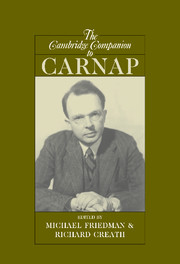Book contents
- Frontmatter
- Introduction: Carnap’s revolution in philosophy
- 1 Carnap’s intellectual development
- 2 Geometrical leitmotifs in Carnap’s early philosophy
- 3 Carnap and Frege
- 4 Carnap and Husserl
- 5 Carnap, Russell, and the external world
- 6 The Aufbau and the rejection of metaphysics
- 7 Carnap and the Vienna Circle: rational reconstructionism refined
- 8 Carnap and modern logic
- 9 Tolerance and logicism: logical syntax and the philosophy of mathematics
- 10 Carnap’s quest for analyticity: the Studies in Semantics
- 11 Carnap on the rational reconstruction of scientific theories
- 12 Carnap on probability and induction
- 13 Carnapian pragmatism
- 14 Quine’s challenge to Carnap
- Bibliography
- Index
Introduction: Carnap’s revolution in philosophy
Published online by Cambridge University Press: 28 April 2008
- Frontmatter
- Introduction: Carnap’s revolution in philosophy
- 1 Carnap’s intellectual development
- 2 Geometrical leitmotifs in Carnap’s early philosophy
- 3 Carnap and Frege
- 4 Carnap and Husserl
- 5 Carnap, Russell, and the external world
- 6 The Aufbau and the rejection of metaphysics
- 7 Carnap and the Vienna Circle: rational reconstructionism refined
- 8 Carnap and modern logic
- 9 Tolerance and logicism: logical syntax and the philosophy of mathematics
- 10 Carnap’s quest for analyticity: the Studies in Semantics
- 11 Carnap on the rational reconstruction of scientific theories
- 12 Carnap on probability and induction
- 13 Carnapian pragmatism
- 14 Quine’s challenge to Carnap
- Bibliography
- Index
Summary
Rudolf Carnap (1891-1970) was a giant of twentieth-century philosophy. He was one of the leading figures of the logical empiricist movement associated with the Vienna Circle and one of the leaders of the analytic tradition more generally. In particular, the defining debates of this tradition involved, at its inception, Gottlob Frege, Bertrand Russell, Carnap, and Ludwig Wittgenstein, and, in a later phase, Carnap and Willard Van Orman Quine. Moreover, Carnap was engaged in significant philosophical interaction with some of the leaders of the continental tradition, including Edmund Husserl and Martin Heidegger. Finally, Carnap was a central participant in key episodes in the development of modern logic associated with Kurt Godel and Alfred Tarski; and, after emigrating to the United States, he also interacted with important American pragmatist philosophers such as Charles Morris and John Dewey. He made major contributions to philosophy of science and philosophy of logic, and, perhaps most importantly, to our understanding of the nature of philosophy as a discipline. It is impossible adequately to understand twentieth-century philosophy without appreciating Carnap's central position within it.
- Type
- Chapter
- Information
- The Cambridge Companion to Carnap , pp. 1 - 18Publisher: Cambridge University PressPrint publication year: 2007
- 3
- Cited by

